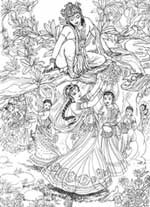Birmingham, UK: June 19, 2003
Sri Srimad Bhaktivedanta Narayana Maharaja
I offer my humble obeisances unto the lotus feet of my paramaradhyatama (topmost worshipable) gurupada-padma om visnupada Sri Srimad Bhakti Prajnana Kesava Gosvami Maharaja, and unto the lotus feet of my siksa-guru om visnupada Sri Srimad Bhaktivedanta Swami Maharaja.
We will be explaining the stage of ruci (taste for bhajana). When ruci comes there is no chance of falling down, at least it is very, very rare that one may fall. At that stage raganuga-bhakti, the greed to serve Sri Sri Radha-Krsna like the Vrajavasis will arise. When ruci comes there is a taste in chanting, remembering, hearing hari-katha, worshipping, cooking and serving in all ways. Sometimes devotees who are not in the stage of ruci want to pretend that they are. This is not good; we should not do this. If ruci has come, one will taste something of para-tattva, the supreme truth. It has been written in the Srimad-Bhagavatam (11.2.42):
bhaktih paresanubhavo viraktir
anyatra caisa trika eka-kalah
prapadyamanasya yathasnatah syus
tustih pustih ksud-apayo 'nu-ghasam
["Devotion, direct experience of the Supreme Lord, and detachment from other things, these three occur simultaneously for one who has taken shelter of the Supreme Personality of Godhead, in the same way that pleasure, nourishment and relief from hunger come simultaneously and increasingly, with each bite, for a person engaged in eating."]
When ruci manifests, many prayers and songs about serving Sri Sri Radha-Krsna like the Vrajavasis automatically come in the heart. One such prayer is as follows:
tad astu me natha sa bhuri-bhago
bhave 'tra vanyatra tu va tirascam
yenaham eko 'pi bhavaj-jananam
bhutva niseve tava pada-pallavam
["My dear Lord, I therefore pray to be so fortunate that in this life as Lord Brahma or in another life, wherever I take my birth, I may be counted as one of Your devotees. I pray that wherever I may be, even among the animal species, I can engage in devotional service to Your lotus feet." (Srimad-Bhagavatam 10.14.30)]
When Lord Brahma saw the opulence of Sri Krsna, he prayed, "Whether I take birth in human form or in any species of life, even if my birth is an insect there is no harm. I want the association of elevated sadhus, and in their guidance I want to serve You. O Lord Krsna, I will consider myself fortunate if I can attain this." After that he prayed:
tad bhuri-bhagyam iha janma kim apy atavyam
yad gokule 'pi katamanghri-rajo-'bhisekam
yaj-jivitam tu nikhilam bhagavan mukundas
tv adyapi yat-pada-rajah sruti-mrgyam eva
["My greatest possible good fortune would be to take any birth in this forest of Gokula and have my head bathed by the dust falling from the lotus feet of any of its residents. Their entire life and soul is the Supreme Personality of Godhead, Mukunda, the dust of whose lotus feet is still being searched for in the Vedic mantras." (Srimad-Bhagavatam 10.14.34)]
"Tad bhuri-bhagyam iha, I will be very fortunate if I take birth in Vrndavana, in any way and in any species of life." In India there are street sweepers who clean away stool and other things. They will sweep away the rubbish of householders, and when they return to their homes they want rub their feet on a piece of stone to remove the dirt. So Lord Brahma prays, "I want to be any piece of a stone in Gokula upon which they will rub their feet." He didn't dare to say that he wants to be a Vrajavasi, or that he wants to take the feet dust of any specific person. Still, he is so fortunate that he has such deep honor for the Vrajavasis that he prays in this way.
He also prays, "Krsna is causelessly merciful. He gave the demoness Putana a high class of liberation by giving her a motherly position, a position as a nurse in Goloka, after her death. The Vrajavasis actually serve Sri Krsna like a mother; so what remains for Krsna to give them, if He has already given Putana position like a mother? What will He give to the gopis who actually have affection for Him and serve Him as a son? We cannot imagine what He will have to do for them.
Lord Brahma remembers the sweet pastimes of the gopis: By hearing the melody vibrated on the flute of Krsna, they left their homes. They left aside what they were cooking and also their service to their husbands. They left aside properly putting on their ornaments and in their hurry to meet Krsna they put the ornaments meant for certain limbs of their bodies on other limbs.
Many also put kajal only on one eye. There is a place in Vraja called Anjanauka, where Krsna played on His flute and where all the gopis went there to meet with Him. Srimati Radhika was also there, and previous to Her coming She had put kajal on only one eye. Krsna asked Her, "Why did You put kajal on only one eye?" She replied "Oh, my sakhis were putting kajal on Me, but I was in a hurry and could not remain at home. I quickly ran here." Krsna then completed the service of putting on Her kajal with His own hand. When Krsna does this, how pleasing it is for Srimati Radhika. It was for this that She ran there.
When the gopis arrive at a place where Krsna played on His flute to call them, they tell Him, "Why did You call us, and then tell us to return back home and serve our husbands? How can we go back?"
cittam sukhena bhavatapahrtam grhesu
yan nirvisaty uta karav api grhya-krtye
padau padam na calatas tava pada-mulad
yamah katham vrajam atho karavama kim va
["Until today our minds were absorbed in household affairs, but You easily stole both our minds and our hands away from our housework. Now our feet won't move one step from Your lotus feet. How can we go back to Vraja? What would we do there? (Srimad-Bhagavatam 10.29.34)]
"We were very much interested and involved in our household activities, but now You very easily took away our hearts. If our hearts are not with us, how can our senses do anything? You tell us to return to our homes, but how can we go back without our hearts, and what will we do there? We cannot return."
And other gopis tell Him, "O Nanda-nandana, are You thinking that we have come to take Your darsana and be with You? Don't think like this! We have come here to execute our household duties, like bringing flowers for our homes. You think that we have come for You? Never think like this. You cannot take our hearts; we know this. How can You take them? We have come to this forest to see its beauty and to collect some flowers, wood, fruits and other paraphernalia. We have not come for You. We have met You simply by chance, but You are so greedy that You want us to stay with You. We will not stay with You for even for a moment." Saying this, they began to leave for their homes, and Krsna began to pray, "Oh, don't go. Listen to Me."
yasyasti bhaktir bhagavaty akincana
sarvair gunais tatra samasate surah
harav abhaktasya kuto mahad-guna
mano-rathenasati dhavato bahih
["All the demigods and their exalted qualities, such as religion, knowledge and renunciation, become manifest in the body of one who has developed unalloyed devotion for the Supreme Personality of Godhead, Vasudeva. On the other hand, a person devoid of devotional service and engaged in material activities has no good qualities Even if he is adept at the practice of mystic yoga or the honest endeavor of maintaining his family and relatives, he must be driven by his own mental speculations and must engage in the service of the Lord's external energy How can there be any good qualities in such a man?" (Srimad-Bhagavatam, 5.18.12)]
All good qualities and these kind of prayers manifest in the devotees heart at the time of ruci. When ruci perfectly matures it then comes to asakti. Ruci is still there, but at the same time, it transforms into asakti. In other words asakti is the more condensed form of ruci. Ruci is in the middle of all the processes of bhakti, and it is therefore called madhyahana-bhajana. Similarly, Sri Krsna's midday pastimes are called madhyahana-lila. In madhyahana-lila Krsna has gone to the forest with millions of cows and millions of friends, roaming from one forest to another. There, the boys play many types of pastimes such as playing on their flutes and buffalo horns. When it is midday Krsna plays a trick. He makes an excuse to leave and tells His cowherd friends, "Wait a little. I am coming back very soon with Madhumangala. Now it is too hot to be here so You should take some rest. I am coming back very soon." He quickly goes from there to Radha-kunda and meets with Srimati Radharani, and after that He again meets Her at Surya-kunda.
Nearby to Radha-kunda is Kusuma-sarovara, and sometimes the sakhis wait for Him there. Kusuma-sarovara is full with flowering trees. Once, knowing that Srimati Radhika would soon be coming with Her sakhis, Krsna climbed one of those trees and hid Madhumangala somewhere nearby. Srimati Radhika then came with all Her sakhis, because She wanted to pick some flowers to make a garland for Krsna. She began to hold on to one of the high branches and pick flowers from it, and that branch happened to be the same branch upon which Krsna had placed all His weight. While Srimati Radhika was picking flowers, Krsna removed His weight from that branch, it flew upward, and Radhika was left hanging and crying. Krsna then quickly jumped from the tree and caught Her.
Srimati Radhika and Sri Krsna also meet at Surya-kunda, a place of very sweet pastimes. Srimati Radhika comes there with all Her sakhis to worship Mitra. Mitra has two meanings, one meaning is the Sun-god and the other meaning is friend. In truth Mitra is Krsna, and for the purpose of pretence, there is a Sun temple there at Surya-kunda
Srimati Radhika sent Srimati Lalita-devi to search for any good brahmana to perform the worship of the Sun. As Lalita was searching, Jatila arrived there and asked Srimati Radhika, "Why are you late?" Srimati Radhika replied, "We have sent Lalita and Visakha to search for a brahmana." A blackish and very effulgent priest came there at that time, and Madhumangala came as His assistant. They both disguised themselves so that no one would recognize them. Wearing sacred threads, they looked just like brahmana boys. Lalita told Jatila, "Oh, I searched in so many places, and finally I saw these brahmanas. This black one is very high class and learned, and He knows how to perform all varieties of worship. When I requested him to come he said, 'I will not go. I don't perform worship for ladies I cannot do this.' I told Him that He could do it from far away, so He has now agreed and has come. But he will not look towards any ladies." Jatila became very happy and said, "Please begin Your worship."
Sri Krsna began to chant the mantra "om mitraya namah." What is the meaning? "I am surrendering to Mitra." Mitra means both Surya and friend. Jatila thought that this was the mantra of Suryadeva but it was actually the mantra of Krsna. When the worship was completed, Jatila very happily said, "Give some ornaments to this brahmana." Radhika refused to give the donation directly. She placed them in the hand of her mother-in-law, who offered them to Krsna, but that black brahmana refused and said, "What need do I have of these ornaments? I will not touch them. I don't need it. I am satisfied. I came by your request, without desire for such remuneration. I am the disciple of Garga Rsi, so I cannot touch any donation from a lady. I am simply satisfied with the hearts of the Vrajavasis." He thought within himself, "I have taken the heart, the most valuable thing", and He was satisfied. Jatila was so happy to hear this, and now she appreciated the brahmana still more. But Madhumangala requested, "You should give the ornaments to me; I will keep them." Jatila then gave him the ornaments and some laddus also, Vraja laddus which are very sweet. So Jatila was very happy and so was Madhumangala." Srimati Radhika and Her friends then went with Jatila to their homes, and Krsna and Madhumangala went back to their friends who were waiting for them.
Madhumangala kept those ornaments and laddus wrapped in his cloth. All of Krsna's friends were embracing Him, asking. "Where were You. We were waiting for You." All were sitting there and Baladeva Prabhu said, "O my brother, this Madhumangala is not telling us anything. He must be hiding something." He asked him, "Do you have something to eat?" Having been sitting there very gravely and silently, Madhumangala now replied, "Don't ask me." He took that bundle and kept it close to him so that no one would be able to take it. But Baladeva Prabhu said to him, "You are a brahmana boy, you should not be so greedy." He and the other cowherd boys came closer to him and quickly they took the parcel, happy and clapping, and Madhumangala became angry. Taking hold of his sacred thread, as Durvasa Rsi would, he said, "I will curse you! I must curse you, unless you return my bundle." In the meantime the boys ate all the laddus, and Madhumangala began to weep bitterly as he told them, "I am going to Nanda Baba to complain. If Nanda Baba will not do anything to help me I will go to Kamsa Maharaja in Mathura and complain to him. He will surely take action." Krsna then embraced him, saying "Oh, I will give you My laddu," and somehow pacified him.
These are some of the pastimes that take place at this time. This madhyahna-lila is the best among all the lilas in asta yam (the eight periods of Sri Radha-Krsna's 24 hour day) and the most long-lasting. In those lilas there are many meetings, many varieties of moods (asta-sattvika bhavas), and they have been written about in Sri Ujjvala-nilamani.
There is so much joking and playing in the pastimes of dola kola (swinging) and vamsi chori (stealing of Sri Krsna's flute). Speaking about Sri Krsna's flute, the gopis tell each other, "This is our greatest enemy." When they played dice Srimati Radhika defeated Sri Krsna and stole it when He wasn't looking. She gave it to Srimati Visakha-devi who gave it to Srimati Lalita-devi. Lalita gave it to Citra who then gave it to Indulekha. Thus it went on, and they hid it very far away from Sri Krsna's view. When the gambling was over, He noticed that His flute was missing and said, "Where is My vamsi, where is My vamsi?" Srimati Radharani told Him "It is with Lalita." He went to Lalita and she said she had given it to Visakha. Krsna kept searching here and there, weeping, "Where is my vamsi?" Citra then told Him "Oh, it is with Srimati Radhika." He ran towards Srimati Radhika who had hidden it in Her garment. Sri Krsna said, "You have stolen my vamsi, not vamsi, My life and soul. What will I do? Now I am like a lame man because My vamsi is not with me. How can I collect all the cows? How can I call all the sakhas if I have no vamsi?" Srimati Radhika replied, "You should sing instead, and You can use Your stick to collect the cows." "O Radhika, I cannot do this. You have taken My life by stealing My vamsi. I cannot remain alive without My vamsi. You should realize My suffering. Don't You realize how sad I am? Please be merciful to Me. Where is my vamsi? You should return it." In this way, Krsna begged Srimati Radhika to return His vamsi
In this way there are so many pastimes in madhyahna-lila, the best and most long-lasting period of the day. It is even better than madhyaratri, the midnight pastimes. Sometimes Krsna plays in the Yamuna, sometimes He eats forest fruits, and sometimes He pretends to be sleeping. He engages in unlimited varieties of pastimes which are written about in Sri Govinda-lilamrta and Sri Krsna-bhavanamrta. In this way they are all serving Sri Krsna and Srimati Radhika. This is the madhyahna-lila.
Next we will come to aparahana-lila, and that corresponds to the stage of krsna-asakti (spontaneous attachment to the object of their bhajana, Sri Krsna. Devotees in the stage of asakti will remember and meditate on pastimes like these. Remembering them, they will think, "How my days and nights have passed away in a moment!" Sri Svarupa Damodara and Sri Raya Ramananda remember all these sweet pastimes and sing the kirtanas of Sri Gita-Govinda and "Sai, Keva Sunailo Syama-Nama" by Sri Candidasa.
sai, keva sunailo syama-nama
kanera bhitora diya, marame pasilo go
akula korilo mora prana
["O My dear sakhi, who is that person who first made Me hear this name "Syama"? When it enters My heart through My ears, I become overwhelmed with impatience." (Sai, Keva Sunailo Syama-nama verse 1)]
Srimati Radhika says, "Who is making Me hear that sweet krsna-nama? By My hearing it, this name has stolen My heart. Why did it do so? Now I am totally mad. Now I am soul-less and lifeless. If the name of Krsna is so influential, then what to speak of Krsna's presence in His form? He lives in Gokula, so how will the gopis be able to protect their chastity here?" Sri Caitanya Mahaprabhu used to hear the padyavalis of Sri Candidasa, Sri Vidyapati, Sri Jayadeva Gosvami, Sri Bilvamangala Thakura and others like them, and His nights passed in a moment in this state: sometimes lamenting, sometimes weeping, sometimes falling down and rolling on the ground, and sometimes becoming unconscious. A devotee in this stage will remember the pastimes of Sri Sri Radha and Krsna and chant: "Hare Krsna Hare Krsna Krsna Krsna Hare Hare Rama Hare Rama Rama Rama Hare Hare."
Lust is a big problem for Western devotees, but if they will remember these pastimes, all their impurities will be washed away and their hearts will be refreshed. This is the only remedy, and I have heard that Srila Bhaktivedanta Swami Maharaja also said this. When someone wrote to him saying, "I am very lusty, what should I do?" He replied "You should hear rasa-lila, the most powerful pastimes of Krsna, and you will very soon be pure." It is not that these pastimes are bad. It is only bad to try to imitate them. You can remember them in the mood of a prayer, but you must not think, "I will do like Krsna."
naitat samacarej jatu
manasapi hy anisvarah
vinasyaty acaran maudhyad
yatharudro 'bdhi-jam visam
["One who is not a great controller should never imitate the behavior of ruling personalities, even mentally. If out of foolishness an ordinary person does imitate such behavior, he will simply destroy himself, just as a person who is not Rudra would destroy himself if he tried to drink an ocean of poison." (Srimad-Bhagavatam 10.33.30)]
Such imitation will be like a very powerful poison for you. Therefore, only those who are qualified should try to remember, not all. First of all prayers should be uttered to come through the stage of anartha-nivrtti.
I have described many elevated and sweet pastimes of Lord Krsna, and I have also explained the process of bhakti from sraddha, to nistha, and up to ruci and asakti. If you try to follow this process totally, you will be very soon qualified to successfully meditate on these pastimes.
I am giving my blessings and so many thanks to those who have arranged this festival and called all the devotees, to the cooking department and management department and all other departments. I am also very happy that the senior-most and sincere devotees of Srila Bhaktivedanta Swami Maharaja are here, hearing patiently. Many thanks to them, because they can very easily take the essence of our classes, and they can preach and help juniors. I request that they help them. If there is no hari-katha the devotees are bound to be weak. I request you to try to carry out and develop all the Krsna conscious programs.
There are so many devotees here, and among them many children. The children should be educated in the bhakti line. It will be very helpful for them if, from the beginning, they are trained in this way: I request you to start a school very soon. If there is no place and you have to rent a place, you can do that. I think there are many ladies who are teachers. They can come and we should try to give them maintenance so that they can work. This should be done very soon. Don't criticize or quarrel. Be under guidance and thus progress and develop your Krsna consciousness.
Gaura premanande!
Transcriber: Kavi Karnapura dasa
Typist: Vasanti dasi
Editor: Syamarani dasi









